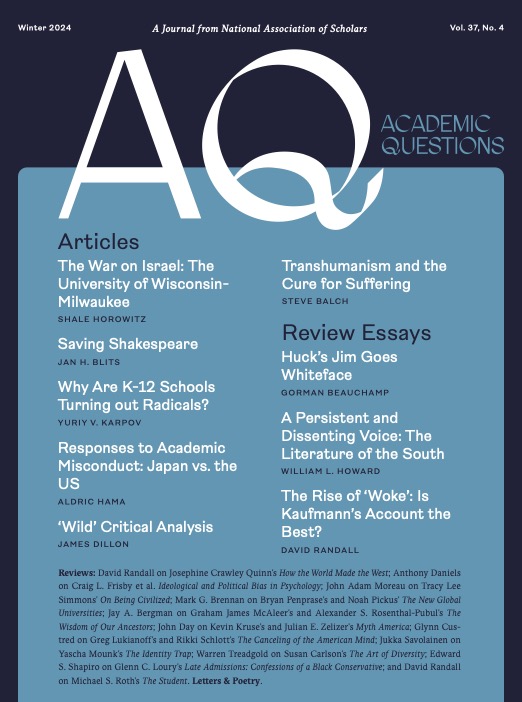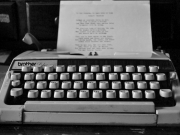ARTICLES
The War on Israel: The University of Wisconsin-Milwaukee
Shale Horowitz, University of Wisconsin-Milwaukee
The paroxysm of anti-Israel and antisemitic sentiment on college campuses after the Oct. 7, 2023 Hamas attack on Israel drew national attention to the torpid response of officials at several elite campuses, including Columbia and Stanford Universities. But Shale Horowitz tells us the failure to enforce laws and university rules on harassment may have been even more egregious at the state University of Wisconsin-Milwaukee.
Saving Shakespeare
Jan H. Blits, University of Delaware
The first step in truly understanding the plays of the Bard is to give careful attention to their dramatic settings. This is no easy task, given the considerable effort the literary world has made toward erasing the intentions of the author himself.
Why Are K-12 Schools Turning out Radicals?
Yuriy V. Karpov, Touro University
From Thomas Matthew Crooks, who attempted to assassinate Donald Trump last summer, to the self-immolating “anti-imperialist” Aaron Bushnell, too many of our young people are angry, depressed, and radicalized. There are a multitude of reasons for this, but none more important than the curricula in our k-12 schools, which teach the young to hate America.
Responses to Academic Misconduct: Japan vs. the US
Aldric Hama
Academics in Japan seem at least as zealous as their Western counterparts to publish their research and, sometimes, to skirt research standards in order to do so. However, a comparison of two recent scandals in biomedical research suggests that Japanese institutions are far more willing to take punitive measures to curb such abuses than their American counterparts.
‘Wild’ Critical Analysis
James Dillon, University of West Georgia
University professors are busy sharing with students the analytical tools of various “critical” theories, while students are only too eager to apply what they’ve learned to real world events. Psychologist James Dillon calls this reckless application of poorly understood theories “wild critical analysis,” and likens it to handing a loaded weapon to a child and walking away.
Transhumanism and the Cure for Suffering
Steve Balch, Texas Tech University
Steve Balch explores possible outcomes of an Artificial Intelligence that is meant to reduce human suffering but that is also devoid of the genetic “leash” of reproduction—“breaking the gene’s dominion over the quality of lived experience.” Perhaps an ersatz heaven on earth will emerge, Balch avers, but the greater likelihood is that AI will treat us “as collateral damage in whatever global makeover the intelligent machines may eventually oversee.”
REVIEW ESSAYS
Huck’s Jim Goes Whiteface
Gorman Beauchamp, University of Michigan (emeritus)
Reviewing Percival Everett’s James: A Novel, a rewrite of Mark Twain’s Huckleberry Finn from the perspective of the slave Jim, critic Gorman Beauchamp wonders if Twain’s “unforgettable invention” is subject to imitation at all.
A Persistent and Dissenting Voice: The Literature of the South
William L. Howard, Chicago State University (ret.)
Once arguably the most important region of the country—four of the first five presidents were from Virginia—the South suffered a devastating loss of cultural importance after the Civil War. William L. Howard assesses the effectiveness of two new studies that attempt to bolster and reclaim the South’s literary gravitas.
The Rise of ‘Woke’: Is Kaufmann’s Account the Best?
Jacob Williams, Oxford University
In the wake of Christopher Rufo’s claim that wokeism was driven by a cabal of 1960s revolutionaries and Richard Hanania’s focus on the perversity of civil rights law, Jacob Williams assesses the veracity of Eric Kaufmann’s The Third Awokening, which locates the genesis of woke ideology in the little examined taboos of the progressive elite.
REVIEWS
In this issue’s very busy schedule of books in review, David Randall starts us off by dissecting Josephine Crawley Quinn’s How the World Made the West: A 4,000 Year History, the latest scholarly effort to offshore the West’s achievements to the rest of the world, while Anthony Daniels wades through the multi-author Ideological and Political Bias in Psychology, the most serious attempt to detail the capture of psychology by a damaging world view.
John Adam Moreau tells us that Tracy Lee Simmons’ On Being Civilized is an erudite discussion of the “dumpster fire of education at all levels, the divorce from the wisdom of the West, the embrace of victimhood,” while Mark G. Brennan believes The New Global Universities can be used as “a field guide to the entrepreneurial administrators reconfiguring the modern university while ‘imagining a new world’ with few constraints.”
Historian Jay A. Bergman enjoys Graham James McAleer’s and Alexander S. Rosenthal-Pubul’s The Wisdom of Our Ancestors because it asks whether there exists “a specifically conservative political philosophy” distinguishable from “liberal cosmopolitanism” or “nationalistic tribalism” on the other.
John Day maintains that Kevin Kruse and Julian E. Zelizer promote “a bitterly cynical view towards our nation’s past and her people’s capacity for goodness” in Myth America: Historians Take on the Biggest Legends and Lies About our Past. Glynn Custred describes Greg Lukianoff’s and Rikki Schlott’s The Canceling of the American Mind as a valuable source for understanding the origins of cancel culture and simply irreplaceable in terms of laying out the ways in which it could be countered.
Speaking of the social justice left, Jukka Savolainen peruses Yascha Mounk’s The Identity Trap: A Story of Ideas and Power in Our Time and comes away convinced that Mounk spends too much time “flattering the moral sensibilities of adherents to woke ideology.” It is this “cognitive coddling” of the elite young, Savolainen explains, that gave rise to their progressive extremism in the first place.
Historian Warren Treadgold gives an assessment of DEI purveyor Susan Carlson’s The Art of Diversity: A Chronicle of Advancing the University of California Faculty, the story of how one high level administrator helped the University of California adopt DEI as a primary educational mission. At the same time, David Randall lambasts Michael S. Roth for using The Student: A Short History to communicate a liberal university president’s “complacent and tranquilizing reassurance that nothing has gone wrong” while American universities have become production lines for the making of “DEI henchmen.”
Finally, Edward S. Shapiro believes we can trust Glenn C. Loury’s memoir Late Admissions: Confessions of a Black Conservative because the renowned political economist speaks unabashedly of his many bad decisions, affirming Orwell’s maxim that “any life when viewed from the inside is simply a series of defeats.”
Photo by Shane Hauser on Unsplash













